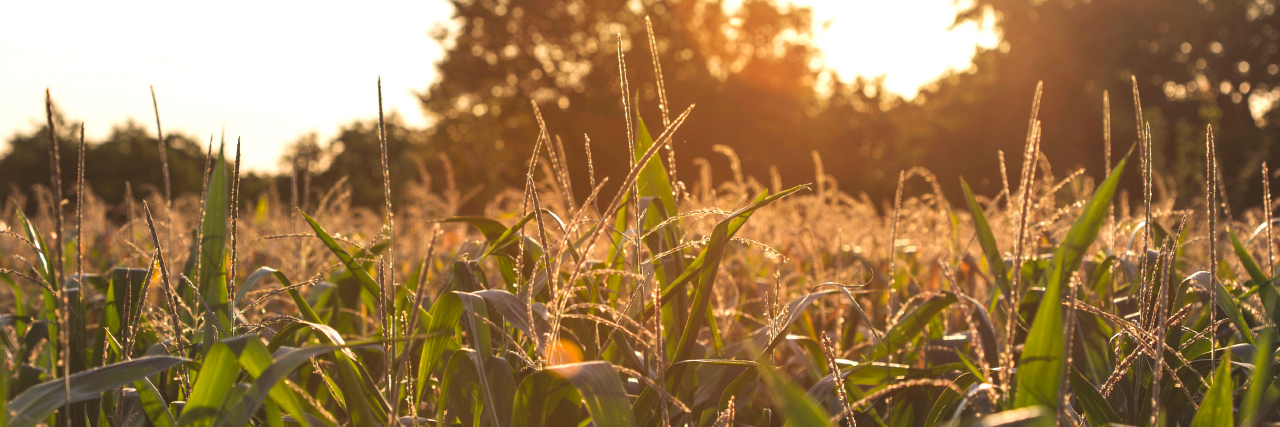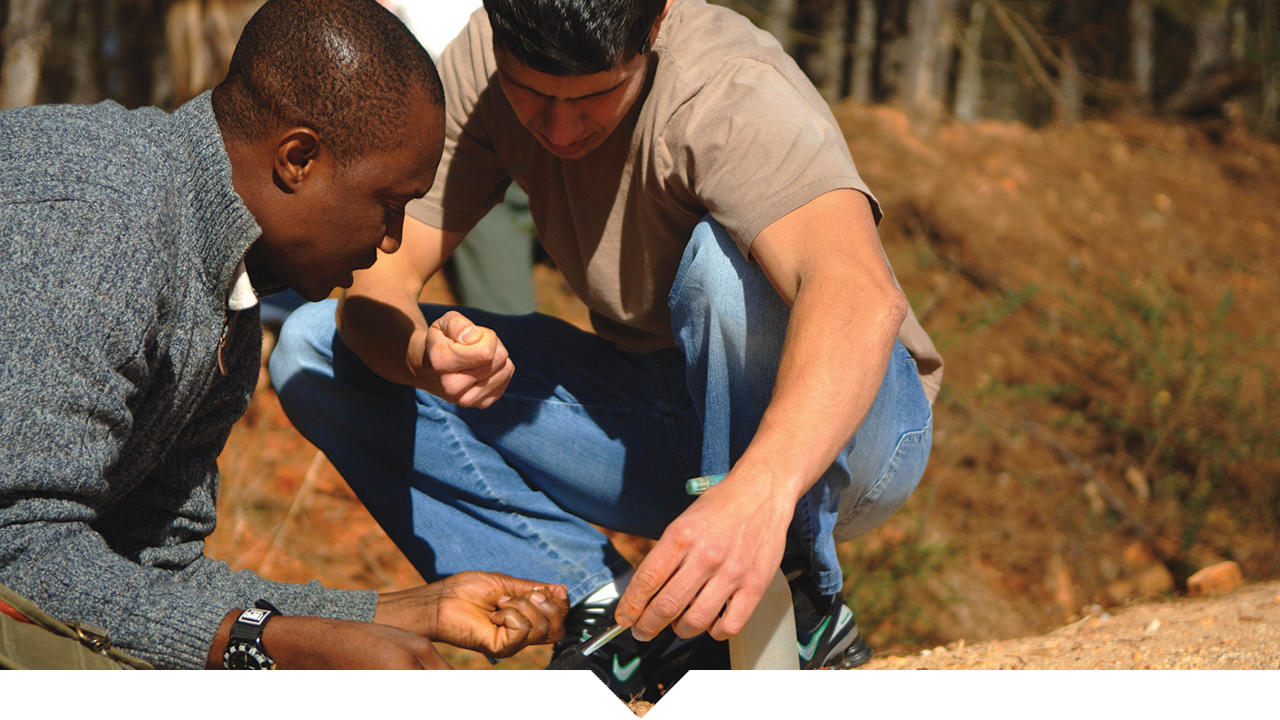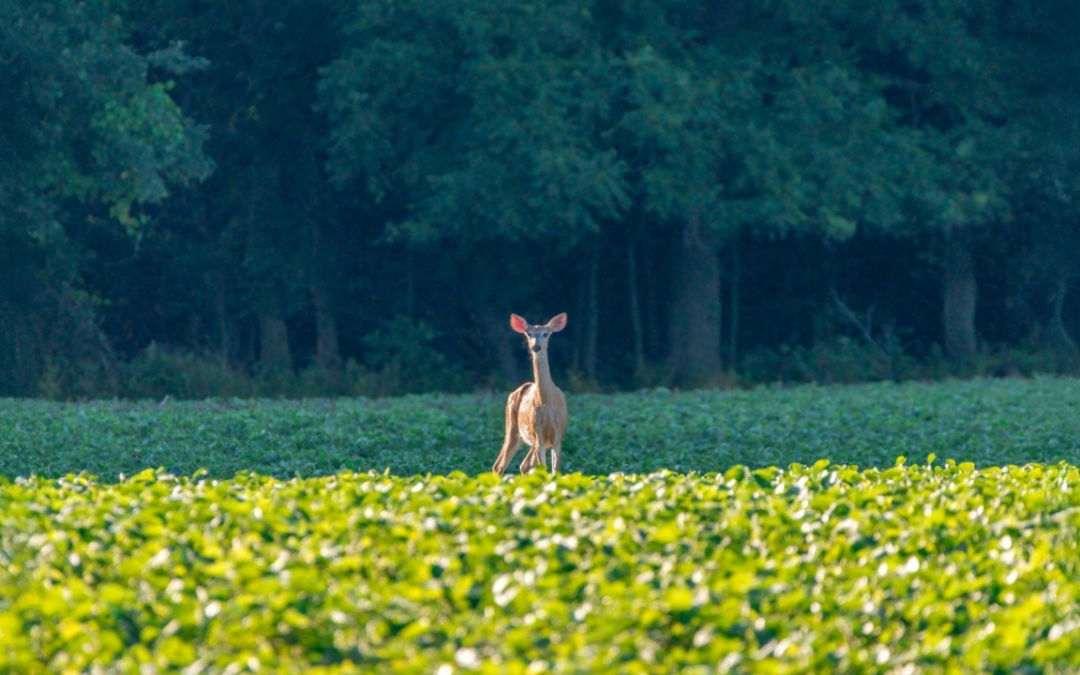
Department of
Crop, Soil & Environmental
Sciences
Creating a Healthier World
Crop, Soil and Environmental Sciences undergraduate research opportunities are extensive. After all, we’re here to train the next generation of soil, weed, plant, turfgrass and environmental scientists to conduct research in areas essential to protecting our natural resources and maintaining a steady supply of food for the world, now and in the future. Companies that hire our graduates look at more than GPAs; they want employees who have well-rounded experiences that include hands-on research skills.

We believe real-world, hands-on experience is the best education.
From Fenway Park to the USDA and from China to South Africa, our students study and intern in some exciting places. Learning only begins in the classroom around here.
Majors
The Department of Crop, Soil and Environmental Sciences is home to a variety of students with a passion for agriculture and the environment. Depending on your interests and career goals, as a student, you can choose from a variety of academic paths, including concentrations in crop science, soil science, turf science and environmental science. Each program uses a strong foundation in science to prepare you for careers in industry, technology, research and related areas.
GRADUATE DEGREES
GRADUATE Certificate
Online Degrees
Feature
Majors & Minors
Graduate Degrees & Programs
CSES Faculty
CSES Staff
Affiliates, Emeriti & Visiting Guests
Graduate Students
Get to Know the CSES Graduate Students
CSES Research
Newsletter
Variety Reports
Apply Now
Contact
Crop, Soil & Environmental Sciences Dept.
201 Funchess Hall
Auburn Univ, AL 36849
(334) 844-4100
Follow Us
Our Students
With degrees in crop, soil and environmental sciences, our students become national soil and turf champions, environmental scientists, farmers, climate-smart engineers, global producers, and genomic and genetic pioneers.
Student Opportunities
The Crop, Soil and Environmental Sciences Department has many opportunities for students, whether it be in undergraduate research, graduate programs, employment, internships, student organizations, or scholarships. Explore the tabs below to see what opportunities await you!
Student Clubs
CSES Clubs
Get involved and get more out of your campus life by joining any of our student clubs and organizations.
- Auburn Young Farmers
- Crop, Soil & Environmental Sciences Club
- CSES Graduate Student Association
- Environmental Action Committee
- Soil Judging Team
- Turf Bowl Team
With more than 20 student groups, the College of Agriculture has something for you no matter what your interest. View COA Clubs & Organizations.
Student Research
Students interested in crop, soil & environmental sciences research are provided excellent support and skills from the CSES department for a successful career path in the agronomy industry.
Study Abroad
Broaden your global perspective, experience different cultures and build your résumé by studying abroad with Auburn’s College of Agriculture. Past countries included China, Cuba, England, France and Vietnam to name a few.
Learn more about COA Study Abroad programs and apply!
Scholarships
The College of Agriculture offers Financial Aid & Scholarships support and resources to assist with paying for college.
Auburn University provides many scholarship opportunities to incoming eligible students through a useful tool called the AU Scholarship Opportunity Manager (AUSOM), which makes it easy to search, view and accept awards.
Internships
Current qualified students interested in gaining real-life workforce experience in areas of crop science, soil science, turf science, environmental science, international trade and/or federal agencies are encouraged to apply for internships.
View COA Student Internships
Expertise & Research Interests
The CSES department continues to be an industry and academic leader, contributing to Auburn University’s land-grant mission. Learn more about CSES research by faculty subject areas below. Research innovations and discoveries are in collaboration with the College of Agriculture and Alabama Agricultural Experiment Station’s research focus areas.
Faculty Research Areas
AGROCLIMATOLOGY
- Dr. Di Tian (Climatology, Hydrology) – Research focuses on understanding and predicting the key components, processes, and interactions of climate, water, and biosystems using novel earth predictions and observations, data analytics and artificial intelligence methods, and process-based simulations.
CHEMISTRY
- Dr. Yaniv Olshansky (Soil Chemistry) – My primary research interests focus on understanding soil biogeochemical processes and their impact on ecosystem services. I study the reactivity of mineral surfaces towards organic molecules (including nutrients and organic pollutants), formation and stabilization of soil organic matter on soil particle (organo-mineral) surfaces, and the control of biogeochemical reactions in subsoils on mineral weathering and elements (re)distribution. In my research, I use advanced analytical methods and instrumented field sites, coupled with statistical and geochemical modeling, to investigate chemical reactions in complex soil-water matrices.
CONSERVATION & TILLAGE
- Kip Balkcom (Peanut Agronomics, Extension) – I am located at the Wiregrass Research Extension Center in Headland, Alabama with a 50/50 research extension statewide appointment primarily focusing on peanut. I concentrate mainly on the agronomic factors such as: varieties, row spacings, seeding rates, seed treatments, planting dates, and various types of tillage. I conduct small plot research on Auburns substations located in the different growing regions as well as on farm research across the state with producers.
- Dr. H. Allen Torbert (Conservation, Waste Management) – National Soil Dynamics Lab
- Dr. Dexter B. Watts (Conservation, Waste Management, Greenhouse Gas) – National Soil Dynamics Lab
Crop Production, Management, Physiology
- Dr. John Beasley – I serve as the administrative Head of the department. My role is to support faculty, staff, graduate students and undergraduate students any way I can that results in their success and professional development.
- Kris Balkcom (Peanut Agronomics, Extension) – I am located at the Wiregrass Research Extension Center in Headland, Alabama with a 50/50 research extension statewide appointment primarily focusing on peanut. I concentrate mainly on the agronomic factors such as: varieties, row spacings, seeding rates, seed treatments, planting dates, and various types of tillage. I conduct small plot research on Auburns substations located in the different growing regions as well as on farm research across the state with producers.
- Dr. Steve Brown (Cotton Agronomics) – As an Extension Cotton Agronomist, I seek to increase the presence and profile of Extension among cotton producers and other cotton-interested agribusiness personnel, towards the goal of the College’s scientists being recognized as a most valued resource for cotton production information in Alabama and the Southeast. An influx of new Regional Agronomic Crops Agents calls for significant training and skill development. I want to participate in the on-going effort to increase their knowledge and experience in cotton, to help them be the best they can be. Cotton agronomic field research activities are targeted at basic, true sustainability, which means maintaining profitability at the farm gate. Specific projects involve cotton variety assessment, seed quality issues, seeding rates, PGR responses and row configurations.
- Dr. Stephen Prior (Row Crops)
- Dr. Brenda Ortiz (Precision Ag)
- Tyler Sandlin (Agronomic Crops, North Alabama) – Currently serving as statewide coordinator for on-farm cotton and wheat variety trials. Research and Extension programming for all cropping systems with a focus in cotton and wheat. Agronomic research trials for cotton harvest aids and herbicide systems in various crops.
- Dr. Alvaro Sanz-Saez (Crop Physiology) – In the Crop Physiology Lab at Auburn University researcher study how row crops (Cotton, peanut, soybean, and corn) adapt to different abiotic stresses such as drought, temperature, elevated CO2 and Ozone, and nutrient deficiencies in order to improve crop tolerance to those stresses. The Lab focuses on understanding how crops can maintain important physiological functions such as photosynthesis, N2 fixation, and complex root structures to tolerate those stresses. The crop physiology lab is implementing new phenotyping technologies to measure these characteristics in a high throughput manner such as rhizo-boxes, hyperspectral reflectance, or new gas exchange methodologies.
FORAGES
- Dr. Leanne Dillard (Forage Agronomics)
MICROBIOLOGY
- Dr. Yucheng Feng (Soil Microbiology) – Dr. Feng’s research focuses on microbial processes that are important to environmental quality and soil productivity. Her lab studies soil microbial community structure in agricultural and forest ecosystems, symbiotic nitrogen fixation in legume crops, microbial degradation of organic pollutants, and microbial water quality.
NUTRIENT MANAGEMENT & SOIL FERTILITY
- Dr. Audrey Gamble (Soil Scientist) – My Extension program is focused on providing research-based information on soil fertility and soil conservation to Alabama row crop producers. My research group performs field evaluations of 1) conservation cropping practices/cover crops to improve soil health and sustainability of row crop production systems and 2) best management practices to increase fertilizer use efficiency in row-crop production systems.
- Dr. Gobena Huluka (Soil Fertility, Plant Nutrition) – Applied soil fertility and chemistry for plant nutrient management and recycles; optimizing soil, plant and water analytical tools to enhance productivity and environmental quality; developing analytical methods for agricultural and environmental applications; international agriculture and development.
- Dr. Yaniv Olshansky (Soil Science, Nutrition) – My primary research interests focus on understanding soil biogeochemical processes and their impact on ecosystem services. I study the reactivity of mineral surfaces towards organic molecules (including nutrients and organic pollutants), formation and stabilization of soil organic matter on soil particle (organo-mineral) surfaces, and the control of biogeochemical reactions in subsoils on mineral weathering and elements (re)distribution. In my research, I use advanced analytical methods and instrumented field sites, coupled with statistical and geochemical modeling, to investigate chemical reactions in complex soil-water matrices.
- Dr. Rishi Prasad (Nutrient Management) – My research and extension program focus area is environmental nutrient management. We are studying nitrogen and phosphorus cycling and transport from poultry litter impacted soils and also developing best management practices and tools to reduce the nitrogen and phosphorus footprints in the environment using a systems approach. We are also working on developing technologies to recover nutrient from manure using novel physio-chemical approaches. Other programing areas include nutrient budgets, P-index, phosphorus loss risk assessment tools, decision support tools for better agronomic production systems, and producers’ education and outreach.
- Kent Stanford (Nutrient Management) – The focus of my work is on nutrient management training and regulatory compliance. I work directly with producers, agencies and farmer organizations who have an interest in manure management, in order to keep current on issues affecting animal agriculture.
- Dr. H. Allen Torbert (Waste Management, Nutrients)
- Dr. Dexter B. Watts (Waste Management)
PHYSICS
- Dr. Thorsten J. Knappenberger (Soil Physics) – Thorsten Knappenberger’s research focuses on irrigation management based on soil sensors and remote sensing, preferential flow in structured soils, constructed wetland hydrology, stormwater management, as well as fate and transport of chemicals in soils. He teaches split-level environmental soil physics and soil resources and conservation courses.
PLANT BREEDING, GENETICS, GENOMICS
- Dr. Charles Chen (Peanut Breeding & Genetics) – Dr. Chen leads AU peanut breeding program to develop peanut varieties with high oleic acid and enhanced environmental stress tolerance while improving desirable agronomic traits and shelling characters. Besides breeding, his research is primarily focused on discovering the underlying mechanism of traits, discovering QTL/Genes links for peanut characteristics, and aiding in the peanut breeding process.
- Dr. Jenny Koebernick (Cotton & Soybean Breeding)
Soil Survey & LAND USE
- Dr. Joey Shaw (Pedology, Soil Survey, Classification, Land Use) – Research exploration of properties, formation, classification and distribution of soils across landscapes.
Turfgrass
- Dr. David Han (Turfgrass Management)
- Dr. Scott McElroy (Turfgrass, Weed Science) – My lab conducts research on herbicide resistance and weed management in turfgrass. With respect to herbicide resistance, my lab is focused on quantifying the level of resistance and resistance mechanism discovery. We conduct research using gene sequencing to discovery mutations and understanding how mutations alter protein to herbicide interactions. My lab also conducts research evaluating weed management tools for weed control in turfgrass. We evaluate both new active ingredients as well as novel uses of older herbicide chemistry.
WATER RESOURCES
- Dr. Eve Brantley (Water Resources, Extension) – Applied research to inform watershed best management practices for riparian corridors, stream restoration, and stormwater runoff. The Extension Water Program focuses on watershed planning, implementation, and stakeholder engagement to protect, restore, and improve water resources in Alabama.
- Dr. Matthew Waters (Water Science, Limnology) – Dr. Matthew Waters is paleolimnologist and paleoecologist who reconstructs environmental change over the past 10,000 years from sediment cores and guano cores. Environmental topics that his lab addresses are the eutrophication of lakes and aquatic environments, the environmental history of human societies, biogeochemical processes through time, climate change impacts, and modern pollution. Dr. Waters teachings introductory environmental science classes as well as upper-level course on Environmental Quality, Climate Change Impacts, and Aquatic Sediments.
Weed Science
- Dr. Steve Li (Weed Science) – Evaluate herbicides and alternative approaches to control weeds in commercial crops and reduce herbicide off-target movement from crop fields. Study interaction among herbicide, crops and high residue cover crops. Detect herbicide injury and off-target movement with UAV based remote sensing techniques. Promote best management practices to Alabama farmers to control weeds more effectively and efficiently.
- Dr. Scott McElroy (Weed Science, Turfgrass) – My lab conducts research on herbicide resistance and weed management in turfgrass. With respect to herbicide resistance, my lab is focused on quantifying the level of resistance and resistance mechanism discovery. We conduct research using gene sequencing to discovery mutations and understanding how mutations alter protein to herbicide interactions. My lab also conducts research evaluating weed management tools for weed control in turfgrass. We evaluate both new active ingredients as well as novel uses of older herbicide chemistry.
- Dr. Andrew Price (Weed Science)
- Dr. David Russell (Weed Science) – My program focuses on providing economical weed management solutions in corn, soybean, small grains, forage/pasture, and non-crop (rights-of-way) systems. We conduct applied research to characterize crop/weed interactions and determine proper management practices for both invasive and herbicide resistant species through integrated approaches. Ultimately, we work to provide research-based weed management solutions that are both practical and profitable for Alabama clientele and stakeholders across the Southeast.

